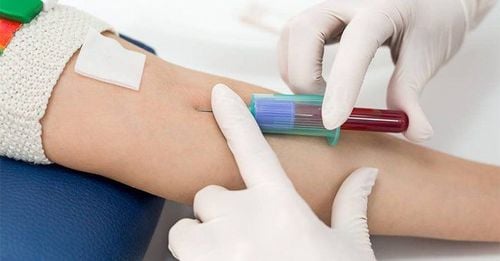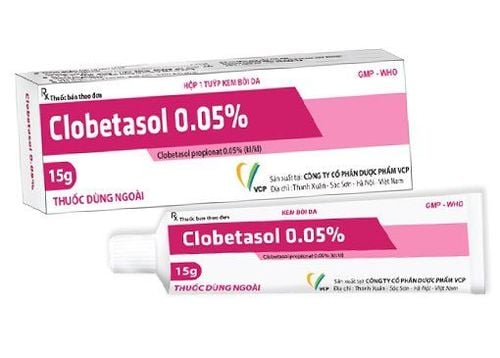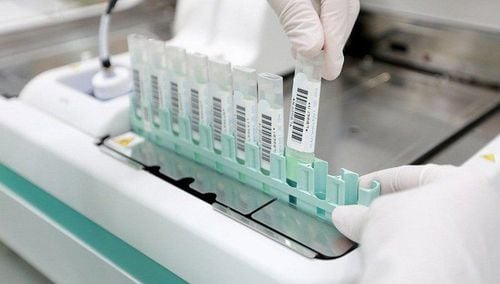This is an automatically translated article.
Cortisol is a hormone produced by the adrenal glands. If cortisol levels are too high or too low, this organ can become dysfunctional or suffer from real disease. In which, the blood cortisol level test in the diagnosis of Cushing's syndrome and adrenal insufficiency is the most common goal in order to make appropriate adjustments in time for the patient.
1. What is Cortisol and What is a Cortisol Test?
Cortisol is a hormone that affects almost every organ in the body. Accordingly, this hormone plays an extremely important role in regulating the following problems:
Coping with stress, both physical and mental, occurs outside and inside the body. Fights infection. Regulates blood sugar levels. Maintain stable blood pressure. Regulates metabolism from food consumed and produces energy. The source of cortisol is produced by the adrenal glands, two small glands located above the kidneys. A cortisol test is a test that aims to measure cortisol levels in the blood, urine, or saliva. However, the blood cortisol test is the most common way to measure cortisol. If the cortisol level is too high or too low, it means the patient has an adrenal gland disorder. These disorders can lead to serious complications if not detected early and treated promptly.

Cortisol được tạo ra bởi tuyến thượng thận
2. What does a blood cortisol level test mean?
A blood, urine, or saliva cortisol test is used to help diagnose adrenal-induced dysfunction. Among them, the measurement of cortisol in the blood is the most commonly performed. It is an indispensable tool for diagnosing conditions including Cushing's syndrome, a condition that causes the body to make too much cortisol on its own, and Addison's disease, conversely, a condition in which the body doesn't make enough of the cortisol it needs. set.
As such, a patient may need a cortisol test if a physician's examination reveals symptoms of Cushing's syndrome or Addison's disease.
Symptoms of Cushing's syndrome include:
Obesity, especially in the trunk area High blood pressure that is difficult to control High blood sugar Purple streaks on the abdomen Skin that bruises easily Muscle weakness Women with may have irregular periods and hirsutism, excess hair Symptoms of Addison's disease include:
Weight loss Fatigue Muscle weakness Abdominal pain Dark patches of skin Low blood pressure Nausea Vomiting Diarrhea Thin hair, easy to fall off

Đau bụng là triệu chứng của bệnh Addison
In addition, for patients admitted to the hospital with acute conditions such as very low blood pressure or hypotension, severe vomiting, severe diarrhea, obvious signs of dehydration on the skin, sudden and severe abdominal pain is even lethargy, confusion, narcosis..., the cortisol test at this time is necessary to identify acute adrenal insufficiency. Because the treatment of acute adrenal insufficiency shock requires the addition of cortisol to the patient, if not diagnosed promptly, the condition has the potential to be progressive and sometimes life-threatening.
3. How to collect samples for cortisol test?
Although this cortisol is present in most body fluids such as blood, urine, and saliva, quantification of this hormone is usually done in the form of a blood test.
Accordingly, specimens are also taken like other blood tests. A nurse or laboratory technician will take a blood sample from a vein in the patient's arm or forearm and place it in a test tube with a suitable preservative. When the number of samples collected is enough for one operation of the machine, the laboratory staff will proceed to load the test tubes into the machine. The entire next process will be performed automatically until the results are printed and sent to the patient.
Because cortisol levels in the body change at every point throughout the day, the timing of blood draw for testing to measure this hormone is important, even influencing later conclusions. In clinical practice, a cortisol blood test is usually performed twice a day, in the morning upon awakening with cortisol levels at their highest for the day, and again around 4 p.m., when cortisol levels are at second peak but much lower than the first.

Xét nghiệm máu giúp đánh giá lượng cortisol trong cơ thể
4. How are the results of the cortisol test determined?
A result with a high blood cortisol level may indicate that the patient has Cushing's syndrome. Conversely, if levels of this hormone are low, Addison's disease or another disease that affects adrenal gland function is suspected.
However, if the cortisol results are abnormal, this does not necessarily mean that every patient has a medical condition that requires treatment. In this context, several factors need to be considered for arguments such as infection, stress and pregnancy. Even birth control pills, exogenous hormone therapy, or other medications can affect blood cortisol levels. Therefore, it is necessary to let the doctor know the medications you are taking to be able to give the most accurate assessment.

Khám sức khỏe định kỳ giúp người bệnh phát hiện sớm bệnh lý
In short, the adrenal gland is one of the important endocrine glands, producing cortisol to regulate every metabolism in the body. Accordingly, testing blood cortisol levels in the diagnosis of Cushing's syndrome and adrenal insufficiency is an essential tool in surveying general pathologies at this organ. Therefore, when having any of the above symptoms, it is necessary to visit a doctor and prescribe appropriate cortisol.
Reference source: medicalnewstoday.com; mayocliniclabs.com
MORE:
Adrenal insufficiency: Causes, symptoms, diagnosis and treatment Harm of Addison's disease (adrenal insufficiency) What health problems is hirsutism in women associated with ?













